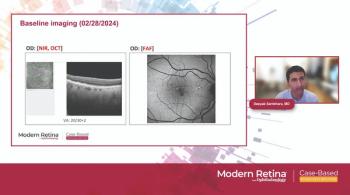
ASRS 2024: The CALM study: Real-world outcomes of fluocinolone acetonide 0.18 mg
Ashkan Abbey, MD, spoke with Modern Retina about his presentation on the the CALM registry study, the 36-month outcomes of real world patients receiving fluocinolone acetonide 0.18 mg at the annual ASRS meeting in Stockholm, Sweden.
Ashkan Abbey, MD, spoke with Modern Retina about his presentation on the the CALM registry study, the 36-month outcomes of real world patients receiving fluocinolone acetonide 0.18 mg at the annual ASRS meeting in Stockholm, Sweden.
Video Transcript:
Editor's note: The below transcript has been lightly edited for clarity.
Ashkan Abbey, MD:
This is Dr. Ash Abbey from Texas Retina Associates. I'm the director of clinical research in our Dallas office. I'm here at ASRS in Stockholm, and I'm presenting data from the CALM registry study, the 36-month outcomes of patients that received in the real world YUTIQ, which is fluocinolone acetonide 0.18 mg implant for the treatment of non-infectious posterior uveitis.
What we found, I think the biggest takeaway from this study was the rate of recurrence being significantly reduced in terms of the uveitis for patients that received this implant. What we saw was that about 84% of patients had had a recurrence of their uveitis in the year prior to receiving the YUTIQ implant. After the injection, when they were followed for up to 36 months, at the 36- month mark, only about 17% ended up having a recurrence of their uveitis during that time.
We can see a significant reduction in flares of uveitis after receiving the implant in the real-world setting. We also looked at visual acuity and OCT findings, and we found that the visual acuity remained relatively stable throughout the course of the study after receiving the implant. Also, [in] the OCT findings, we found a slight reduction in central subfield thickness over time at a mean reduction at 36 months of about 10% compared to baseline.
Finally, we looked at IOP outcomes as well. Roughly, about 22% of patients had been on IOP, lowering medications at baseline before entering the study and actually receiving the implant. That number increased to about 36% at 36 months after receiving the YUTIQ implant.
Overall, what we see here is that in the real-world setting, the results of using YUTIQ are similar to what we saw in the phase 3 clinical trials. We also are seeing a significant reduction in rates of recurrence after receiving the implant in the real world and we're seeing expected visual acuity and safety outcomes with respect to IOP as well. We have a good product here that we have real-world data on that we can continue to utilize for our patients with non-infectious posterior uveitis.
Newsletter
Keep your retina practice on the forefront—subscribe for expert analysis and emerging trends in retinal disease management.










































